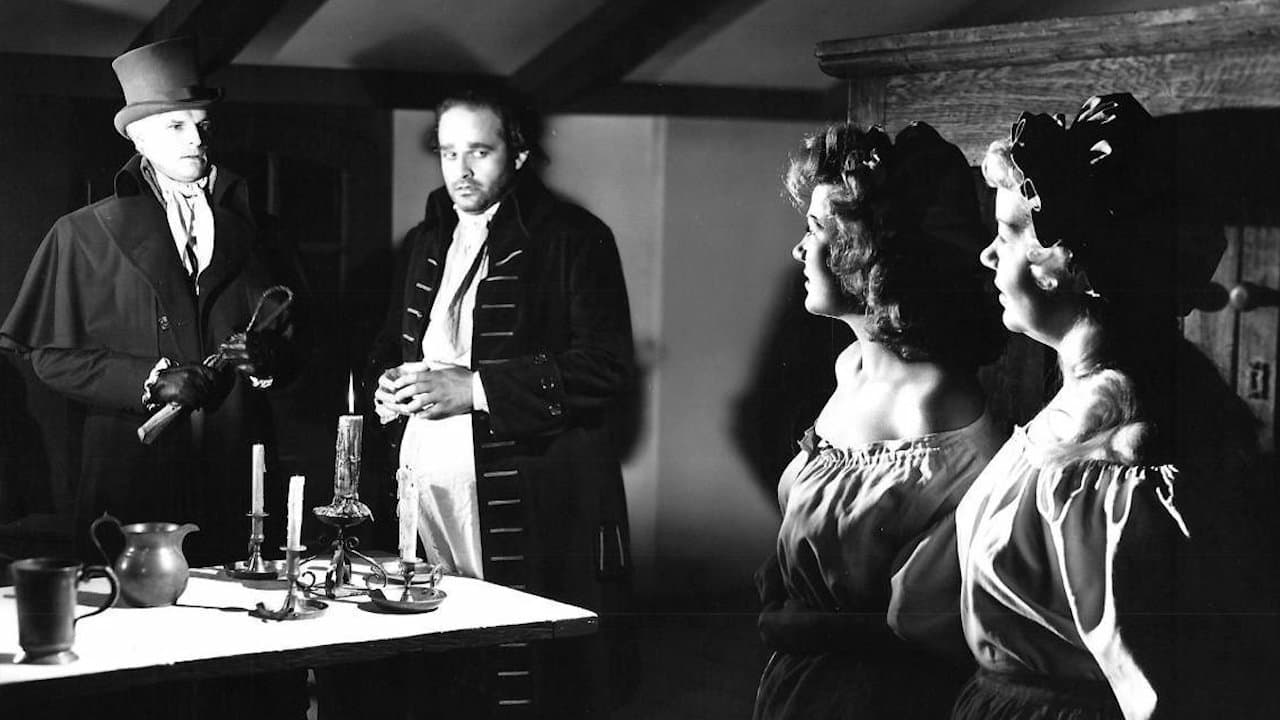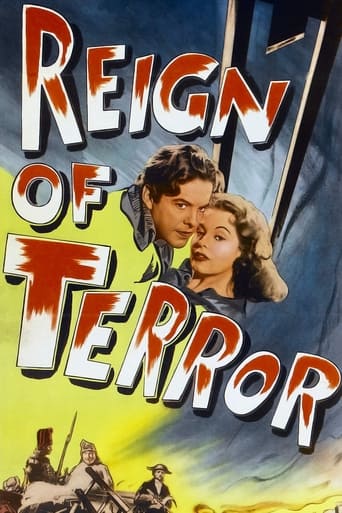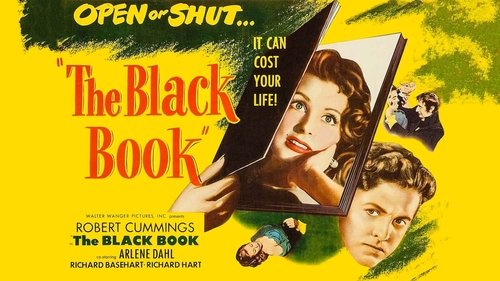


What makes it different from others?
... View MoreStrong acting helps the film overcome an uncertain premise and create characters that hold our attention absolutely.
... View MoreThis is one of the best movies I’ve seen in a very long time. You have to go and see this on the big screen.
... View MoreOne of the most extraordinary films you will see this year. Take that as you want.
... View MoreA few nights ago I watched SABOTEUR directed by Alfred Hitchcock. When it was over, I watched a DVR recording of this film by Anthony Mann. What do both these titles have in common? Robert Cummings, of course.It occurs to me while watching REIGN OF TERROR just how expressive Cummings and his face are. Watch him in a scene without the sound, and you will see what I am saying. There are so many moods and so many bursts of energy that flash across his countenance as he delivers dialogue or handles bits of stage direction. Maybe this is because he is just one of those actors naturally at ease in front of the camera regardless of the role he's playing. And maybe it helps that he is working with good directors. Still, the expressions are genuine and not gimmicky. Those windows into what he's feeling and experiencing, they are completely real. His close-ups are intensely personal. Especially when he is conveying awe. Or terror.
... View More"The Black Book" or "Reign of Terror" is a fictitious story that takes place during the infamous 1793-94 French Revolution period known as The Reign of Terror. Historians may yet be divided on the virtuous or vile nature of Robespierre (apparently, he was known for both). But this film leaves no doubt about his consenting to, if not instigation of many murders of innocent people. Richard Basehart's Robespierre shows the cleverness and oratory for which his character was known. And he plays the would-be dictator of France to the point of madness in some scenes. Note his "logical" reasoning to support killing of many innocent people. That portrayal leads one to think that perhaps the man was driven partially by a paranoia that was fueled by the uncontrollable and uncivilized conditions which he himself helped create. Robert Cummings plays the hero of this film very well. Cummings was most known after the mid 20th century for his comedy and romance roles in film and on TV. But he had many dramatic roles early in his career, and was very adept at acting in all types of roles and all film genres. The other characters are well played as well. Arlene Dahl as Madelon, Arnold Moss as Fouché, Norman Lloyd as Tallien, and Jess Barker as Saint Just. The dialog is particularly sharp and crispy for Robespierre's character. In an early scene, he has condemned an innocent man to the guillotine without even a trail. The man's wife pleads with Robespierre who is unyielding. She says, "Stop playing God." He replies: "God? The revolution abolished God. There's only the will of the people. And the people have spoken." Toward the end, Saint Just says, "The mob's gone mad. They'll tear us to pieces." Robespierre replies, "I made the mob. The mob are my children. They won't turn against their father."Then he shows the power the real Robespierre must have had to mesmerize the people. "The greatest death a man can die is for his own people. But you would then be without a leader. If I go, who takes my place? Let the man step forward who can follow in the steps of Robespierre. I have led you through the darkness. If I sought the power of dictatorship, it was not for personal glory. Your will is my will. I bear no man ill. I have killed only for you."In real life, Robespierre said, on February 5, 1974, that "Terror is nothing else than justice, prompt, severe, inflexible." (See: "Pageant of Europe," Ed. by Raymond P. Steams, 1947) In this movie, a man shoots Robespierre in the mouth; but in real life, he attempted suicide. He shot himself but the bullet just shattered his jaw. The next day he was guillotined without a trial, in the same fashion that he himself had sent so many to their death. A few films have been made about Napoleon, the War of 1812, and other European battles of the late 18th and early 19th centuries. But not many films have been made that look critically at the French Revolution and the turmoil that completely changed a national culture – not all for the best. Perhaps that's why – the ugly actions and drastic measures that were anything but vestiges of freedom and human rights. So, while this film is fiction, the events it covers are very real. And, it doesn't shy away from showing the horrors of the time. For that reason, "The Black Book" has some historical value as a film. History buffs and those who like intrigue and action should enjoy this film.
... View MoreRobert Cummings, Richard Basehart, Arlene Dahl, and Norman Lloyd star in this excellent little tense thriller set during the French Revolution. I went into this knowing nothing, and really the viewer doesn't need to know anything. If you love fast-paced espionage films, this is the one to see. With great production values supervised by director Anthony Mann, this has to be one of the best movies made in 1949, even though it's been forgotten in the years since. Robert Cummings is looking for a certain book, obviously, to bring down Richard Basehart, who's in power and control over the people. And, Arlene Dahl has never looked lovelier. One of the film's best attributes is in creating the mood and moment as it heightens the tension, while the law is looking for Bob and Arlene at an old farmhouse and the quiet scenes are very memorable and tense. From there on, the film is on another plane entirely and is better than one would expect from such a little film. If you've never seen this, you're missing one of the best films to come from director Anthony Mann.
... View MoreROBERT CUMMINGS and ARLENE DAHL are improbably cast in a grim tale of the French Revolution during the famous reign of terror following the storming of the Bastille. RICHARD BASEHART plays the treacherous keeper of "The Black Book", Robspierre, seen in powdered wig, a man with a twisted mind and soul, who declares that "the Revolution has abolished God." JESS BARKER is an equally treacherous henchman, a soldier of the Republic assigned to find the man who stole the infamous book listing the names of the enemies of France.The low-key B&W photography hides most of the sets in deep shadows, giving the impression that it covers the low-budget production values and at the same time gives the story a film noir ambiance.Cummings and Barker, usually cast in more lightweight material, are fine in some sketchily written roles and Dahl is her usual attractive self, little more, as a woman of mystery.RUSS TAMBLYN has a minor early role and BEULAH BONDI has a small part as a woman who knows the whereabouts of the Black Book.It ends, of course, with the downfall of the evil Robspierre and his cohorts.Summing up: Fairly interesting, but Arlene Dahl's make-up and hairdo is strictly from a modern era. She never quite fits the mold of a period costume heroine, more like an anachronism in an otherwise convincing French Revolution setting.
... View More